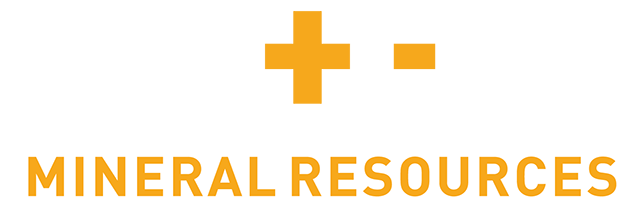Vancouver, British Columbia – (August 16, 2022) – Battery Mineral Resources Corp. (TSXV: BMR) ("BMR” “Battery" or the "Company") is excited to announce a robust NI 43-101 resource update for its Punitaqui copper mining complex in Region IV of Chile. This resource estimate, completed for Battery by independent consultants JDS Energy & Mining Inc. (“JDS”), is a major milestone for the company.
The resource estimate is based on our Phase 1 drill program, initiated in August 2021 which totalled 32,526 meters (“m”) of diamond core drilling and also includes the drilling and mining data from the Cinabrio mine completed by prior operators including Glencore PLC. The BMR Phase 1 drilling focused on three zones at Punitaqui: Dalmacia, San Andres, and Cinabrio Norte. An updated technical report will be filed on the Company’s website and SEDAR within 45 calendar days of this disclosure.
Highlights:
- This Punitaqui resource update is separated into four underground resource zones: Dalmacia, San Andres, Cinabrio Norte and Cinabrio.
- Total sulphide indicated resources are 6.2M tonnes grading 1.14% Cu and 2.47 g/t Ag.
- Total sulphide inferred resources are 3.1M tonnes grading 0.93% Cu and 2.64 g/t Ag.
- At the Cinabrio mine, the remanent pillars contain sulphide indicated resources of 1.0M tonnes at 1.51% Cu which could be mined in conjunction with the use of mine backfill.
Battery CEO and director Martin Kostuik stated; “We are very proud of the outcome of our Phase 1 drilling and the work done jointly by our team and those at JDS Energy and Mining, Inc. to produce this NI 43-101 resource estimate for Punitaqui. It was always our goal to define 4M to 5M tonnes of total resources at Punitaqui to give us approximately four to five years of potential mining, so we are thrilled to be able to report Indicated resources of over 6M tonnes at grades similar to the historical values seen by previous operators. This resource estimate will be the first of many for Punitaqui and we plan to pursue an aggressive exploration drill program focussed on extensions to the known resources as well as a series of brownfields targets within our Punitaqui Mine Complex land holdings. We are particularly optimistic about the future potential of the Dalmacia zone, where the majority of the current resource estimate incorporates only one-third of the known strike length based on the drilling thus far. We believe it’s important to note that, before this resource report, only the Cinabrio mine had underground resources. This demonstrates are ability to find new mineralization and we will endeavour to continue this successful process while the mine is in operation. Combined with the strong metallurgical results released July 13th, we believe we have successfully demonstrated that the Punitaqui project has as bright a future as it has ever had. To hear more, click the link below”.
https://www.youtube.com/watch?v=rpjrBq4-UtM&t=47s
Table 1: Punitaqui Sulphide Mineral Resource Estimate by Zone
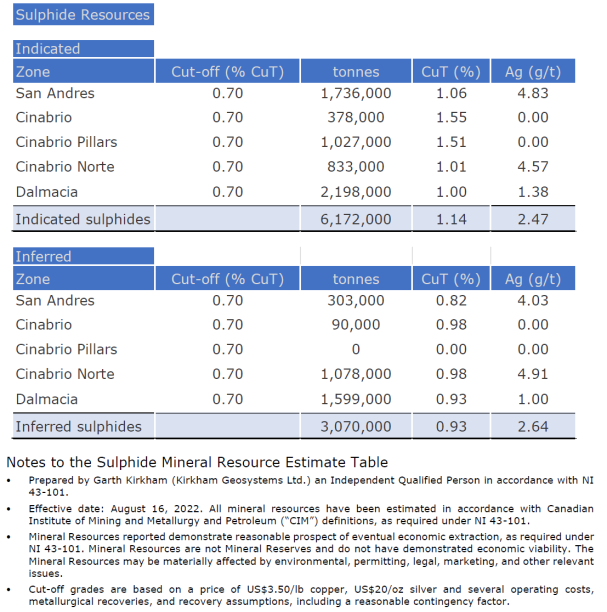

Note that all four zones of the resource estimate (the Cinabrio mine, the Cinabrio Norte zone, the San Andres zone and the Dalmacia zone) have underground access previously established by our predecessors.
Figure 1: Punitaqui Project Tenement Holdings, Resource Areas & Plant Location Map
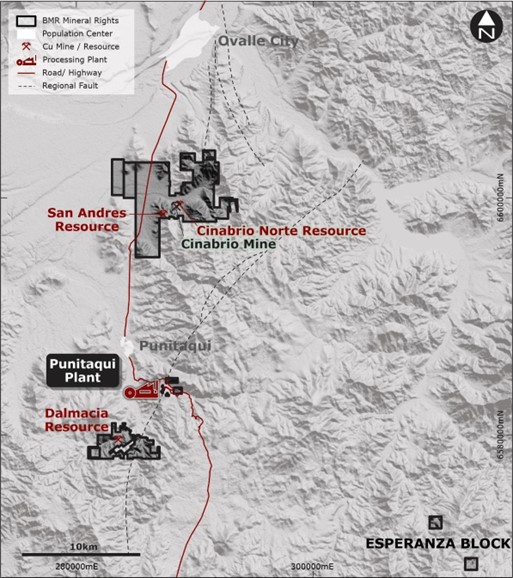
Cinabrio Mine Resource
- This Cinabrio mine was the main source of copper ore for the Punitaqui processing and concentration plant for nine-plus years while the Punitaqui Complex was in operation.
- BMR plans to initiate mining at Punitaqui in the Cinabrio mine as this area requires the least amount of ore development to begin extraction. The San Andres zone will be the second area to be mined at Punitaqui. Final operating and environmental permits for mining both the Cinabrio mine and the San Andres zone are expected in the next one to two months.
- BMR plans to begin underground drilling certain areas of the Cinabrio mine that our technical team have identified as having strong potential to yield additional resources in the coming months.
Cinabrio Norte Zone Resource
- This resource is the first such calculation for the Cinabrio Norte zone. The drill results reported from Cinabrio Norte were very encouraging as this area immediately north of the Cinabrio mine had very minor drilling prior to the BMR Phase 1 surface drilling program.
- The Cinabrio Norte zone is open at depth, which BMR plans to continue drilling from underground once access has been established. Potential mining of this zone would commence once permits have been granted for this area which have already been submitted approval.
San Andres Zone Resource
- This resource is the first such calculation for the San Andres zone.
- The main mineralized area of the San Andres zone has now been traced for up to 450m in strike, up to 200m in width and up to 30m in thickness.
- The planning for a Phase 2 RC infill drill program at San Andres is well underway with the construction of all drill pads already completed.
Figure 2: Plan Map of Cinabrio Mine, Cinabrio Norte & San Andres Historic & BMR Phase 1 Drill Collars
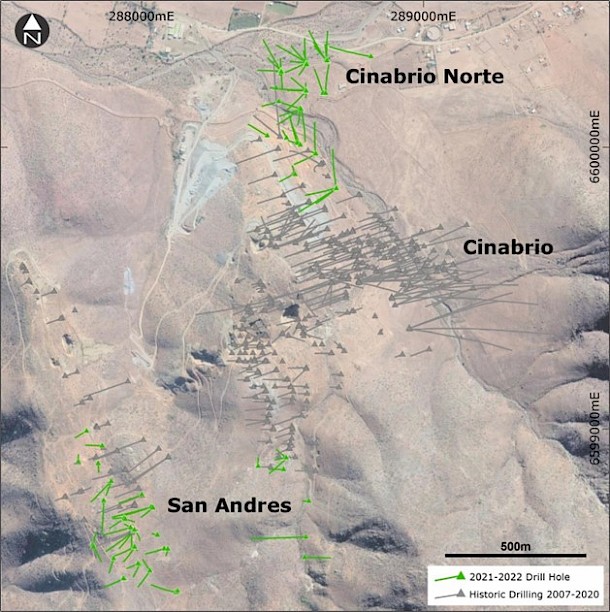
Dalmacia Zone Resource
- The resource estimate for the Dalmacia zone is an underground resource. Previously, only an open pit resource was calculated for Dalmacia in the estimate completed by JDS in 2018 for Xiana Mining Inc.
- The vast majority of the sulphide resources in the resource calculation for the Dalmacia zone are contained the circled area in Figure 3 below, which encompasses approximately one-third of the known strike extent and thus the company is optimistic this resource could be substantially increased by further infill drilling, which will commence in the coming months.
- Mining at Dalmacia could commence when permits are granted for this area which have already been submitted for approval.
Figure 3: Plan Map of Dalmacia North Historic & BMR Phase 1 Drill Collars
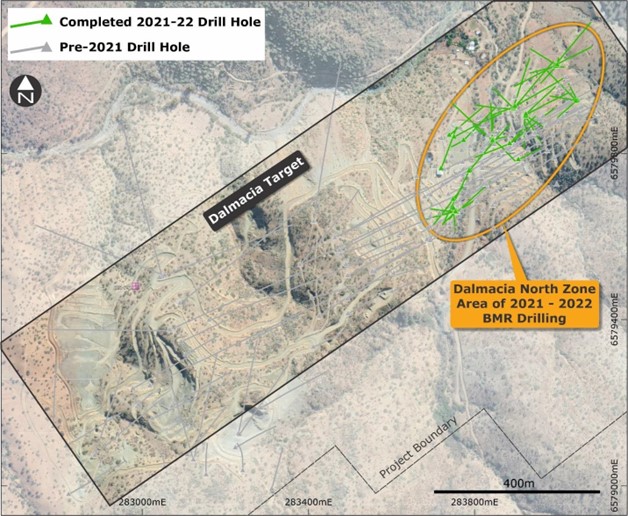
Oxide Resources
In addition to the sulphide resources, an oxide near surface resource was calculated at Dalmacia, which is show in Table 2. At present, BMR is not planning to proceed with mining oxides at Dalmacia but may study the possibility of this in the future.
Table 2: Punitaqui Oxide Resources at Dalmacia
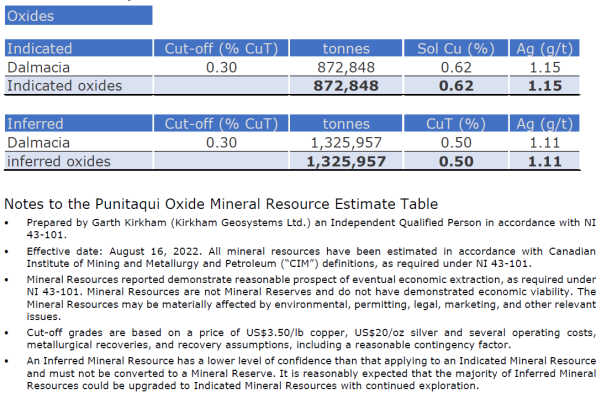
Geology and Mineral Resource
The Punitaqui project is a past producing copper-gold mining complex located about 50 km south of the Andacollo Copper mine owned by Teck Resources Region 4 of Chile, near the towns of Punitaqui and Ovalle. The asset consists of a centralized process plant that to be fed by four satellite copper deposits - San Andres, Cinabrio, Cinabrio Norte, and Dalmacia.
Geology
The mineral resource has a surface area of 2,000m x 750m and between elevations of -270 meters and 650m meters above sea level. The updated estimate is a result of surface drilling along with underground drilling and sampling by BMR and previous operators 3,762 drill holes and channel samples). The mineral resource estimate is based on robust geological models, supported by underground infrastructure that allowed underground mapping, channel sampling, and underground drilling that was critical to BMR’s current understanding and validation of the Punitaqui geological models.
The differences in resources from this estimate (effective date August 16, 2022) compared to the previous resource estimate is due not only to additional surface drilling but also improved interpretation and modelling of the lithological units which was imperative for potential underground mining operations.
Mineral Resource Estimation Methodology
The mineral resource estimate for Punitaqui was prepared to industry standards and best practices by Garth Kirkham, P.Geo., an Independent Qualified Person for the purposes of NI 43-101. The mineral resource was estimated using commercial mine modelling and geostatistical software.
From a total of 3,762 drillhole and channel samples, the San Andreas, Cinabrio, Cinabrio Norte and Dalmacia deposits were estimated with 509, 2,853, 75 and 325 drillhole and channel samples, respectively. These datasets are a combination of validated and verified historic data performed by previous operators and recent drilling performed by BMR.
Each of the deposits were segregated into multiple estimation domains based on geologic models which were coded for geological matching within the database. Composites were created to 1.0-meter composite lengths which offered the best balance between supplying common support for samples and minimizing the smoothing of grades. To eliminate any potential over-estimation due to the effect of high-grade outliers, cumulative frequency plots were analysed to determine appropriate thresholds for which to cut the outlier grades. The copper outlier thresholds chosen San Andreas, Cinabrio, Cinabrio Norte and Dalmacia were 4%, 5%, 2.5% and 4.5%, respectively. The silver outlier threshold chosen were 20 g/t for San Andreas and 30 g/t for Cinabrio Norte as there was no significant silver for Cinabrio nor Dalmacia.
All block models are orthogonally oriented apart from Dalmacia that is rotated to 325 degrees. In addition, all block models have 2m x 2m x 2m dimensions and are sub- blocked to 0.25m x 0.25m x 0.25m for ease of mine planning. All mineral resources were estimated using ordinary kriging interpolation for the continuous domains and validated using nearest neighbour and inverse distance estimates.
Search ellipse anisotropy and orientation were guided by the orientation of the domain solids models. Copper and silver block grades were estimated from capped composited samples in a single pass. Specific gravity readings were derived from measurements within the individual deposits and assigned as an average within the mineralized zones.
Mineral Resources are classified under the categories of Indicated and Inferred according to CIM guidelines. Mineral Resource classification for silver was based primarily on drill hole spacing and on continuity of mineralization. Indicated resources were defined as those with a drillhole spacing of than ~30 meters and informing at least four drill holes. Inferred resources were defined as those with a drill hole spacing of less than ~60 meters distance and informing at least three drillholes.
Final resource classification shells were manually constructed on plan sections and all resources are constrained within lithological domains and by the continuous domain solids. Final Resource classification shells were manually constructed on sections. Mined out underground ramp material was extracted from those deposits that have underground development. Silver was not classified separately and is reported based on the copper classification schema. These interpreted boundaries were created for the indicated and inferred thresholds to exclude orphans and reduce potential “spotted dog” effect.
This estimate is also based upon the “reasonable prospect of eventual economic extraction” based on reasonable potentially underground mining shapes, using estimates of reasonable operating costs and price assumptions.
Qualified Persons
The Mineral Resource Estimate in this release has an effective date of August 16, 2022, and was prepared in accordance with NI 43-101 by Garth Kirkham, P.Geo., a Qualified Person for NI 43-101. Mr. Kirkham is an employee of Kirkham Geosystems Ltd., and is an independent Qualified Person as defined by National Instrument 43-
101. The scientific information in this release was reviewed by Peter Doyle, P.Geo., Vice President Exploration for BMR. Both Qualified Persons have read and approved the information contained in this press release.
Quality Control
Sample preparation, analysis and security procedures applied on the BMR exploration projects is aligned with industry best practices. BMR has implemented protocols and procedures to ensure high-quality collection and management of samples resulting in reliable exploration assay data. BMR has implemented formal analytical quality control monitoring for all field sampling and drilling programs by inserting blanks and certified reference materials into every sample sequence dispatched.
Sample preparation is performed by ALS Global - Geochemistry Analytical Lab in La Serena, Chile and sample analyses by ALS in Lima, Peru. ALS analytical facilities are commercial laboratories and are independent from BMR. All BMR samples are collected and packaged by BMR staff and delivered upon receipt at the ALS Laboratory. Samples are logged in a sophisticated laboratory information management system for sample tracking, scheduling, quality control, and electronic reporting. Samples are dried then crushed to 70% < -2 millimeters and a riffle split of 250 grams is then pulverized to 85% of the material achieving a size of <75 microns. These prepared samples are then shipped to the ALS Laboratory in Lima Peru for analyses by the following methods:
- ME-ICP61: A high precision, multi-acid digest including Hydrofluoric, Nitric, Perchloric and Hydrochloric acids. Analysed by inductively coupled plasma (“ICP”) mass spectrometry that produces results for 48 elements.
Certified standards are inserted into sample batches by ALS. Blanks and duplicates are inserted within each analytical run. The blank is inserted at the beginning, certified standards are inserted at random intervals, and duplicates are analysed at the end of the batch.
About Battery Mineral Resources Corp.
Battery Mineral Resources (“BMR”) is a battery minerals company providing shareholders exposure to the global mega-trend of electrification while being focused on growth through cash-flow, exploration, and acquisitions in favourable mining jurisdictions. Battery Mineral’s mission is the discovery, acquisition, and development of battery metals (namely cobalt, lithium, graphite, and copper), in North America, South America and South Korea, to become a premier and responsible supplier of battery minerals to the electrification marketplace. BMR is currently pursuing a potential near-term resumption of operations in late 2022 of the Punitaqui Mining Complex, a past copper-gold producer, in the Coquimbo region of Chile. BMR is the largest mineral claim holder in the historic Gowganda Cobalt-Silver Camp in Ontario, Canada, and continues to pursue a focused program to build on the recently announced, +1-million-pound high-grade cobalt resource at McAra. In addition, Battery Mineral owns 100% of ESI Energy Services, Inc. a profitable mainline pipeline and renewable energy equipment rental and sales company with operations in Alberta, Canada and Arizona, USA. Battery Minerals Resources is based in Canada and its shares are listed on the Toronto Venture Exchange under the symbol “BMR” and on the OTCQB under the symbol “BTRMF”. Further information about BMR and its projects can be found on www.bmrcorp.com.
For more information, please contact: Martin Kostuik, CEO
Phone: +1 (604) 229 3830
info@bmrcorp.com
Mars Investor Relations
+1 (604) 335-1976
bmr@marsinvestorrelations.com
Harbor Access Corp. 475-477-9402
jody.kane@harbor-access.com
Twitter: @BMRcorp_
www.bmrcorp.com
Neither the TSXV nor its Regulation Services Provider (as that term is defined in the policies of the TSXV) accepts responsibility for the adequacy or accuracy of this press release.
Forward Looking Statements
This news release includes certain “forward-looking statements” under applicable Canadian securities legislation. There can be no assurance that such statements will prove to be accurate, and actual results and future events could differ materially from those anticipated in such statements. Forward-looking statements reflect the beliefs, opinions and projections of the Company on the date the statements are made and are based upon a number of assumptions and estimates that, while considered reasonable by the Company, are inherently subject to significant business, economic, competitive, political and social uncertainties and contingencies. Many factors, both known and unknown, could cause actual results, performance, or achievements to be materially different from the results, performance or achievements that are or may be expressed or implied by such forward-looking statements and the parties have made assumptions and estimates based on or related to many of these factors. Such factors include, without limitation, the ability of the Company to obtain sufficient financing to complete exploration and development activities, the ability of the Company to complete the Debenture offering, risks related to share price and market conditions, the inherent risks involved in the mining, exploration and development of mineral properties, the ability of the Company to meet its anticipated development schedule, government regulation and fluctuating metal prices. Accordingly, readers should not place undue reliance on forward-looking statements. Battery undertakes no obligation to update publicly or otherwise revise any forward-looking statements contained herein, whether because of new information or future events or otherwise, except as may be required by law.
